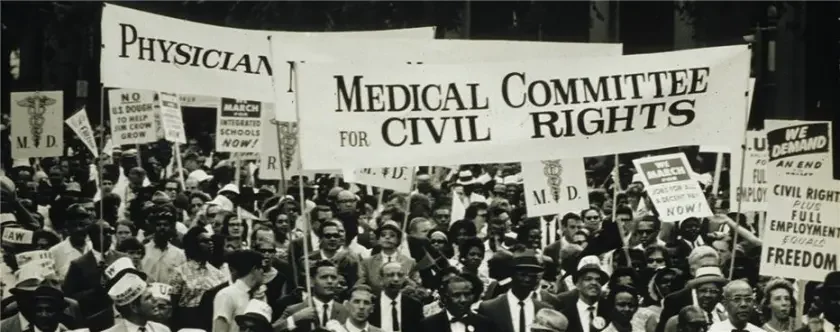Celebrating the legacy of Dr. Martin Luther King, Jr. demands we reckon with health inequities

Today, as we celebrate Dr. King’s life, the Waxman Strategies team reflects on the tremendous amount of work that remains to achieve his vision for a more just world, including a health care infrastructure that works for all of us. The COVID-19 pandemic laid bare existing inequities in our nation’s public health and health care systems, elevating the intersecting systems of injustice which result in decreased access, poorer outcomes, and higher rates of preventable morbidity and mortality for communities of color, low-income people, and other marginalized groups.
A huge range of factors beyond the health care system impact a person’s health status and outcomes, including education quality and access, economic stability, physical infrastructure and environment, food security and nutrition, community support, and more. These societal factors are all impacted by policy choices, making them fallible to the racism and injustice that can underpin the political process. These same determinants can inform the boundaries around what is possible with regards to “healthy” and “unhealthy” outcomes.
There is no “one size fits all” solution to addressing social determinants of health or building a more equitable and just health care system. Doing so demands we examine the underpinnings of existing policies, review historical and real-time data, and identify evidence-based alternatives that address underlying causes of inequitable outcomes. It also requires believing that we can build towards something better at a time when hope can sometimes feel naïve.
Having leaders in government committed to advancing equity in health care makes achieving progress seem more attainable. We are heartened by some recent actions by the Biden administration and Congress which highlight their commitment to equity, and their dedication to listening to advocates who have been sounding the alarms on injustice in health care for generations. Some recent activities that begin to undo the harms in our inequitable systems include:
- The creation of the first Office of Climate Change and Health Equity (OCCHE) within the Department of Health and Human Services (HHS). The mission of OCCHE is to “protect vulnerable communities who disproportionately bear the brunt of pollution and climate-driven disasters.” HHS Assistant Secretary for Health Dr. Rachel Levine has committed to using lessons from the COVID-19 pandemic to inform the work of this important office, recognizing that the impacts of climate change are likely to be experienced most acutely by the same communities who have been most impacted by COVID-19.
- A “refresh” of the Center for Medicare and Medicaid Innovation (CMMI) to prioritize funding innovative health care models which center equity. A strategic white paper released in 2021 reflects a transformational new direction for this center, explicitly linking health care quality with health equity. CMMI, which funds innovative models in health delivery with the goals of creating lasting solutions, will now require that models embed equity at the center of their design. The Center has also included measurable criteria to drive these efforts.
- Allowing states to extend Medicaid coverage from 60 days to 12 months postpartum. This provision, included in the landmark American Rescue Plan Act passed last spring, will go into effect in April of this year. Due in no small part to structural racism and implicit bias, Black and American Indian and Alaska Native women are at least two times more likely to die from a pregnancy-related cause than white women. With the Medicaid program covering over 40 percent of births in the United States, and with Black women more than twice as likely to have their births covered by Medicaid than white women, this policy change has the potential to make a meaningful difference in maternal morbidity and mortality.
- The appointment of a political leadership team that truly reflects the diversity of the United States, including the historical appointments of Chiquita Brooks-LaSure, the first Black woman to lead the Centers for Medicare and Medicaid Services, and Dr. Rachel Levine, the first openly transgender person confirmed by the United States Senate. Representation is a meaningful part of progress and a commitment to diverse personnel lays the groundwork for the development of policies based on a range of lived experiences and expertise.
These important changes will result in meaningful progress, inching towards a more just and equitable world. But we know there is so much more work to be done to rebuild our health care systems to center those who have been historically cast aside and meet the needs of this moment. Waxman Strategies proudly commits to listening to, learning from, and acting with the communities who are all too often harmed by the system meant to protect their health. While our country remains so far from the future dreamed of by Dr. King, on this day we are strengthened by his steadfast knowledge that that future is possible.

